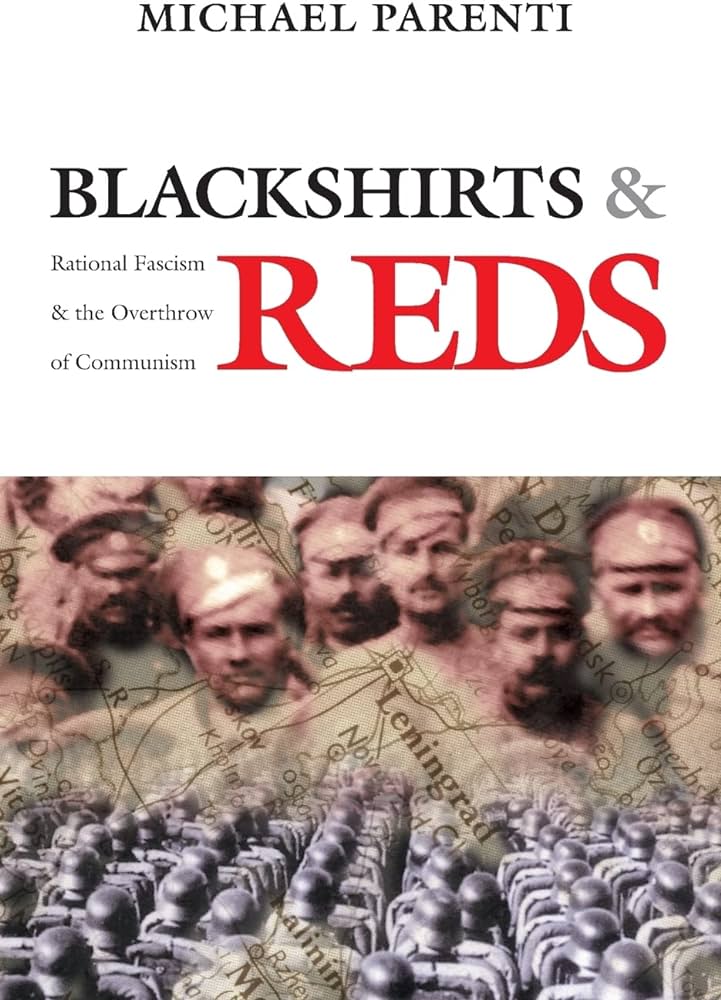■ Michael Parenti, Blackshirts and Reds (San Francisco: City Lights Books, 1997)

In the thirty-two years since the Soviet Union was dissolved and Fukuyama’s “end of history” began, more and more young people are becoming communists. Multiple failures of capitalism—runaway rent and housing costs, and unabated climate disaster—are bringing young people to the realisation that there is no future in this system.
The propaganda campaign to undermine and demonise socialism and communism has been virulent and effective. Parenti’s book is important because it dispels many of the misconceptions about socialism, exploring its positive elements and highlighting the repressive nature of capitalism and imperialism.
In the second chapter, entitled “Let us now praise revolution,” Parenti discusses the benefits of socialism. He explains how socialist countries are not inherently aggressive and confrontational. He maintains that “revolutionary governments like Cuba, Libya, Vietnam, and North Korea were—and still are—eager to trade and maintain peaceful relations with [the United States].”
These countries never have posed, and still don’t pose, a threat to the West: they only pose a threat to Western financial capital.
Parenti goes on to list the benefits of actually existing socialism. He looks at the radical policies in relation to land reform and advances in education, housing, and health services. Socialist states also ended patriarchal and class oppression.
Cuba under Fidel Castro is a great example of socialism working to better the lives of the people. Parenti notes that “infant mortality in Cuba has dropped from 60 per 1000 in 1960 to 9.7 per 1000 in 1991, while life expectancy rose from 55 to 75 in that same period. Smallpox, malaria, tuberculosis, typhoid, polio and numerous other diseases have been wiped out by the improved living standards and public health programs.”
Chapter 4, titled “Communism in Wonderland,” looks at the faults of some socialist projects. The book is not blind propaganda and is open to discussing what worked and what didn’t work. It talks about the overwhelming bureaucracy, and how in agricultural policies where food was demanded by quantity, and not quality, many took advantage by producing poor-quality food.
This chapter also talks about how people in the East were susceptible to propaganda that romanticised the West. People had their basic needs satisfied, and wanted more. The big problem faced in Eastern European states was the socialist generation, who saw such things as free university education and took it for granted. They didn’t fully grasp that they were the first or second generation in their entire family line who would have been able to go to university.
The youth started to fetishise capitalism because of not understanding it. They heard the slogans about the problems, but many genuinely believed that if they worked hard under capitalism they would become rich.
The book cites an article from the New Yorker. When the socialist system in Poland collapsed and the free market swooped in, a reporter asked a Polish worker what he would do if his factory was closed, to which the worker replied, “The state will find us some other work.”
The people of the socialist states wanted the security net of socialism but with the consumer goods and the perceived mobility of capitalism.
Many who emigrated to the United States from Eastern Europe complained about the crime, working conditions, lack of communitarian spirit, and the ignorance of Americans, among other dissatisfactions.
Chapters 6 and 7, “The free-market paradise goes east,” I and II, show how oppressive and exploitative the free-market system was when imposed on Eastern Europe. The average Eastern European saw their quality of life dramatically diminish. In Russia, living standards were virtually halved with the economic reforms. There was “a dramatic rise in unemployment, homelessness, air and water pollution, prostitution, spousal abuse, child abuse and just about every other social ill.”
Blackshirts and Reds offers a lucid, engaging and often humorous exploration of the benefits and flaws of socialism. It functions as a refreshing antidote to the ahistorical anti-communist propaganda pumped out by right-wing think tanks and the mainstream media.
It is essential reading for everyone born after the fall of the Soviet Union who wants to engage with and understand the socialist project in good faith.






